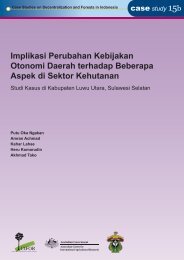Adaptive collaborative management of community forests in Asia ...
Adaptive collaborative management of community forests in Asia ...
Adaptive collaborative management of community forests in Asia ...
You also want an ePaper? Increase the reach of your titles
YUMPU automatically turns print PDFs into web optimized ePapers that Google loves.
2 • Robert Fisher, Ravi Prabhu and Cynthia McDougall<br />
is happen<strong>in</strong>g to human be<strong>in</strong>gs and our planet, <strong>in</strong> this first decade <strong>of</strong> the<br />
twenty-first century.<br />
In this book we take the position that <strong>in</strong> a world as complex as ours, buffeted<br />
as it will be by shocks, surprises and uncerta<strong>in</strong>ty <strong>of</strong> all k<strong>in</strong>ds, the best we can<br />
do as managers or ‘stewards’ is to let go <strong>of</strong> the notion <strong>of</strong> control, fixed plans<br />
and solutions. Instead, we need to take our cue from the natural world<br />
and from communities such as those described <strong>in</strong> this book, and try to be<br />
<strong>in</strong>clusively, <strong>in</strong>tentionally and proactively adaptive. How best we might do<br />
this is the question we ask ourselves throughout this book, as we exam<strong>in</strong>e<br />
empirical evidence from case studies <strong>in</strong> <strong>Asia</strong>. We, the forest researchers and<br />
forest communities <strong>in</strong>volved, can <strong>of</strong>fer <strong>in</strong>sights on adaptation that can help<br />
others <strong>in</strong>terested <strong>in</strong> manag<strong>in</strong>g <strong>forests</strong> and improv<strong>in</strong>g the livelihoods <strong>of</strong> poor<br />
people. We also believe there are lessons to be learnt for the stewardship <strong>of</strong><br />
the planet we <strong>in</strong>habit.<br />
How people became important <strong>in</strong> forest <strong>management</strong><br />
<strong>in</strong> <strong>Asia</strong><br />
In the second half <strong>of</strong> the n<strong>in</strong>eteenth century, state-controlled <strong>forests</strong> <strong>in</strong> <strong>Asia</strong><br />
came under <strong>management</strong> by forest services staffed by scientifically tra<strong>in</strong>ed<br />
foresters. This approach was first evident <strong>in</strong> India, with the establishment<br />
<strong>of</strong> the Indian Forest Service after the German botanist Dietrich Brandis<br />
was <strong>in</strong>vited by India’s colonial masters <strong>in</strong> 1860 to make the <strong>management</strong><br />
<strong>of</strong> Pegu’s rich teak <strong>forests</strong> more susta<strong>in</strong>able. It quickly spread to most other<br />
<strong>Asia</strong>n countries.<br />
Dur<strong>in</strong>g the late 1960s and the 1970s, challenges to this approach arose <strong>in</strong><br />
some parts <strong>of</strong> <strong>Asia</strong>, as it became clear that state control had <strong>of</strong>ten been<br />
<strong>in</strong>effective and that forest cover was rapidly decreas<strong>in</strong>g. It was commonly<br />
thought that the ma<strong>in</strong> cause <strong>of</strong> deforestation <strong>in</strong> the so-called develop<strong>in</strong>g<br />
countries was pressure from rural people, particularly result<strong>in</strong>g from a high<br />
rate <strong>of</strong> population <strong>in</strong>crease. Consequently, it was assumed, <strong>in</strong>volv<strong>in</strong>g rural<br />
people <strong>in</strong> forest <strong>management</strong> activities (def<strong>in</strong>ed as protection <strong>of</strong> <strong>forests</strong> and<br />
plantation <strong>of</strong> new <strong>forests</strong>) would help reverse, or at least arrest, the decl<strong>in</strong>e.<br />
We now know that the assumptions about causes were simplistic, as were<br />
the proposed solutions. Pressure from rural people was only one <strong>of</strong> a host<br />
<strong>of</strong> other factors, such as excessive commercial logg<strong>in</strong>g, lack <strong>of</strong> legal access
















